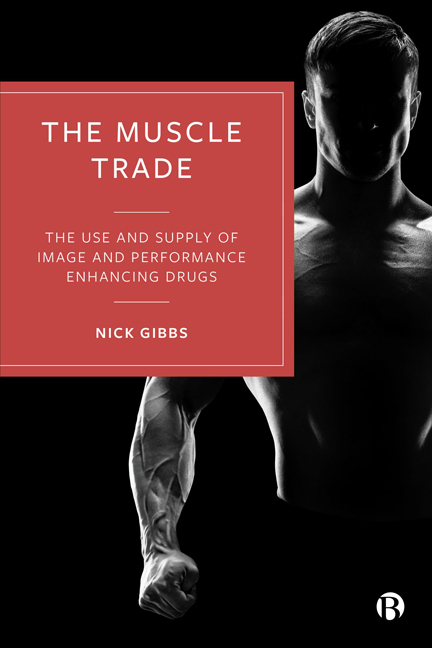Book contents
5 - Instrumentality, Competitiveness, and Hyper-conformity
Published online by Cambridge University Press: 28 March 2024
Summary
Building out from Chapter 4’s psychoanalytic foundation, we can now turn to the more instrumental motivations as well as the immediate environmental influences that drive my sample’s drug use. While I have argued that the need for perpetual dissatisfaction is universal, this chapter looks at the specific contexts in which the motivation to enhance the physique is played out.
Sporting success and the need to win
The most common instrumental motivation behind IPED consumption cited by my sample was a will to win in their sporting endeavours, coupled with the acknowledgement that “everybody else is going to be [using IPEDs]” (Ben). Involvement in competitive sport increases the likelihood of IPED consumption by 91 per cent (Sagoe et al, 2014) and therefore the instrumental use of drugs for athletic success constitutes a mainstay in the existing literature. A typical example of this can be found in my interview with amateur bodybuilder and online coach Sam, when I asked him about his decision to initiate drug use:
N: So when was the moment that you chose to go on cycle for the first time? What drove you to that?
S: Basically, I wanted to win. I wanted to become a pro, but with my genetic make-up if I didn’t push onto that next level then it would have taken me a very long time to get there. In competitive bodybuilding it’s not illegal, it’s not like you’re a professional footballer where you’ll fail a doping test. So for me it wasn’t a decision that I’ll cheat, it was just part of the sport.
This excerpt epitomizes the dual themes discussed within this section. First, Sam’s privileging of his comparative performance over his long-term health illustrates his deep commitment to the competitive individualistic values of the bodybuilding community (see Kotzé et al, 2020). This dogma was echoed by Dom, who told me “I have an athlete’s mindset, a competitive mindset and that’s why I do everything that I do”. This “athlete’s mindset” works in concert with a resignation that “everyone you’re up against will be taking gear” (Kyle) to create a perfect storm for competitors, who feel a pressure to use IPEDs to avoid being cut adrift from their fellow contenders (see Grogan et al, 2006).
- Type
- Chapter
- Information
- The Muscle TradeThe Use and Supply of Image and Performance Enhancing Drugs, pp. 72 - 79Publisher: Bristol University PressPrint publication year: 2023



